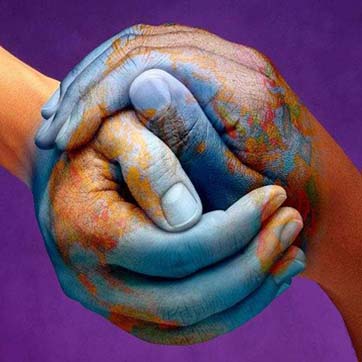As I read these headlines, I was also moved by an email I received: a student could not participate in my course because the government of the nation where this student resided blocked access to many sites. The student could not perform unbiased research-- or perform research at all, in some cases-- so the student was forced to withdraw, hoping to take the course again when back in the U.S.
 This made me think hard about the globalization that many universities aim to promote. In my online summer course, for example, I have several international students, and they are taking the course from their home country. While I took into consideration time frame issues, language barriers, and the ways that cultural notions of identity might affect their writing, I did not consider permission to access information or speak about that information. I did not consider that freedom of speech is not a right in every country.
This made me think hard about the globalization that many universities aim to promote. In my online summer course, for example, I have several international students, and they are taking the course from their home country. While I took into consideration time frame issues, language barriers, and the ways that cultural notions of identity might affect their writing, I did not consider permission to access information or speak about that information. I did not consider that freedom of speech is not a right in every country.I come to education with a very Western view. I believe in democracy. I believe in freedom of speech. I use a more hands-off approach to teaching, rather than an authoritative stance, and I don't mind or discourage students when they have different views from my own. But these instances make me realize the challenges to embracing a globalized society and appreciating diverse cultures. How do I even begin to work within the frame of a culture that considers most of what I stand for is a threat to its way of life? Can I educate those students? How do I respect their culture and still teach in a way that I believe is most ethical? What is ethical?
For all the complaints I make against the United States of America and its government, I feel very lucky to live here, where I'm allowed to make those complaints and where I am allowed to have a voice despite being a woman. This is highlighted for me when I see headlines like the one I mentioned or hear people speak about their own governments that restrict information access. I know that my voice is shaped by cultural forces, and that a truly free voice is an ideal that likely cannot been reached, but I have been able to develop my voice in ways that would not be possible in more restricted areas of the globe. Is my freedom to develop my voice oppressive to others thought? Is it freedom or oppression if I ask students to buy into the view that unbiased research is important and that authority figures are fallible? Am I expanding their worldview, or am I making it impossible for them to complete their American educations?
Of course, I am also curious about university policy. I have seen almost every university push for globalization by advertising the number of countries that have sent students to the university, by pushing students to study abroad, and by allowing and promoting the existence of cultural organizations on campus. However, at least an adjunct, I have never seen any policy in regards to international students' abilities to complete work from their home countries. Does the university consider that governments may restrict access or limit free speech when they allow students to take courses online internationally? And how do they expect me, as an instructor, to respond when a student says that he or she is unable to fulfill the requirements of a course because of government restrictions in their home nation?
In this instance, I can only continue to develop more questions. It is too soon in my thinking process to come up with answers.
No comments:
Post a Comment